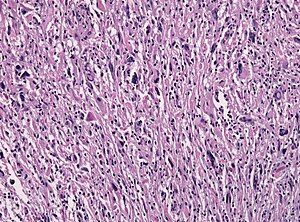Difference between revisions of "High-grade astrocytoma with piloid features"
Jump to navigation
Jump to search
Jensflorian (talk | contribs) (Category) |
Jensflorian (talk | contribs) (HGAP) |
||
| (One intermediate revision by the same user not shown) | |||
| Line 1: | Line 1: | ||
'''High-grade astrocytoma with piloid features''' is a rare [[Glioma|glial]] tumor which often requires methylation analyis to secure diagnosis. There is currently no definitive grading, but clinical behaviour suggests WHO CNS grade 3. | {{ Infobox diagnosis | ||
| Name = {{PAGENAME}} | |||
| Image = Pilocytic astrocytoma with anaplastic features.jpg | |||
| Width = | |||
| Caption = High-grade astrocytoma with piloid features. [[H&E stain]]. | |||
| Synonyms = | |||
| Micro = | |||
| Subtypes = | |||
| LMDDx = [[astrocytoma]], [[PXA]], [[glioblastoma]] | |||
| Stains = PAS-D +ve (eosinophilic granular bodies) | |||
| IHC = GFAP +ve | |||
| EM = | |||
| Molecular = | |||
| IF = | |||
| Gross = usually cerebellar | |||
| Grossing = | |||
| Site = brain - usu. [[cerebellum]] | |||
| Assdx = | |||
| Syndromes = | |||
| Clinicalhx = | |||
| Signs = | |||
| Symptoms = | |||
| Prevalence = very rare - esp. in children | |||
| Bloodwork = | |||
| Rads = | |||
| Endoscopy = | |||
| Prognosis = poor (analog to WHO Grade III) | |||
| Other = | |||
| ClinDDx = | |||
| Tx = | |||
}} | |||
'''High-grade astrocytoma with piloid features''' (HGAP) is a rare [[Glioma|glial]] tumor which often requires methylation analyis to secure diagnosis. There is currently no definitive grading, but clinical behaviour suggests WHO CNS grade 3. | |||
| Line 8: | Line 40: | ||
*Imaging may be similiar to [[Glioblastoma]]. | *Imaging may be similiar to [[Glioblastoma]]. | ||
*5-year OS: 50%. | *5-year OS: 50%. | ||
*De novo cases in the setting of neurofibromatosis 1 reported. | |||
*Tumors may have history of previous radiation. | |||
=Histology= | =Histology= | ||
| Line 17: | Line 51: | ||
*Perivascular lymphocytic cuffing. | *Perivascular lymphocytic cuffing. | ||
*Necrosis may be present. | *Necrosis may be present. | ||
==Images== | |||
<gallery> | |||
Image:Pilocytic astrocytoma with anaplastic features.jpg | HGAP, [[FFPE]] specimen, HE (WC). | |||
Image:Pilocytic astrocytoma with anaplastic features mimicking focally a GBM.jpg | Vacular proliferations and necrosis in HGAP mimicking [[GBM]] (WC). | |||
</gallery> | |||
=IHC= | =IHC= | ||
| Line 30: | Line 70: | ||
*TERT promotor mutations are rare. | *TERT promotor mutations are rare. | ||
*Absence of IDH1/2 hotspot mutation. | *Absence of IDH1/2 hotspot mutation. | ||
=Prognosis= | |||
*Poor, but better than conventional glioblastoma.<ref>{{Cite journal | last1 = Rodriguez | first1 = FJ. | last2 = Scheithauer | first2 = BW. | last3 = Burger | first3 = PC. | last4 = Jenkins | first4 = S. | last5 = Giannini | first5 = C. | title = Anaplasia in pilocytic astrocytoma predicts aggressive behavior. | journal = Am J Surg Pathol | volume = 34 | issue = 2 | pages = 147-60 | month = Feb | year = 2010 | doi = 10.1097/PAS.0b013e3181c75238 | PMID = 20061938 }}</ref> | |||
*Prognostic unfavourable paramters include: Necrosis, Mitoses and previous radiation. | |||
| Line 43: | Line 87: | ||
[[Category:Diagnosis]] | [[Category:Diagnosis]] | ||
[[Category:Neuropathology tumours]] | |||
Latest revision as of 13:54, 17 October 2022
| High-grade astrocytoma with piloid features | |
|---|---|
| Diagnosis in short | |
 High-grade astrocytoma with piloid features. H&E stain. | |
| LM DDx | astrocytoma, PXA, glioblastoma |
| Stains | PAS-D +ve (eosinophilic granular bodies) |
| IHC | GFAP +ve |
| Gross | usually cerebellar |
| Site | brain - usu. cerebellum |
|
| |
| Prevalence | very rare - esp. in children |
| Prognosis | poor (analog to WHO Grade III) |
High-grade astrocytoma with piloid features (HGAP) is a rare glial tumor which often requires methylation analyis to secure diagnosis. There is currently no definitive grading, but clinical behaviour suggests WHO CNS grade 3.
Clinical
- Rare (1-3% of all brain tumor in adults).
- Usu. posterior fossa (75%).
- Supratentorial or spinal locations possible.
- Imaging may be similiar to Glioblastoma.
- 5-year OS: 50%.
- De novo cases in the setting of neurofibromatosis 1 reported.
- Tumors may have history of previous radiation.
Histology
- Often so variable, so molecular testing is essential to secure diagnosis.
- Astrocytic nature of tumor cells.
- Frequent mitoses.
- Elongated glial tumor cell processes ("piloid").
- Rosenthal fibers or eosinophilic granular bodies.
- Perivascular lymphocytic cuffing.
- Necrosis may be present.
Images
IHC
- GFAP+ve.
- ATRX: nuclear loss in approx. 40%.
Molecular
- DNA Methylation profile of high-grade astrocytoma with piloid features is essential for diagnosis.
- MAPK genes often altered (NF1, BRAF fusion, FGFR1, KRAS).
- CDKN2A/B homozygous deletion.
- CDK4 amplification.
- TERT promotor mutations are rare.
- Absence of IDH1/2 hotspot mutation.
Prognosis
- Poor, but better than conventional glioblastoma.[1]
- Prognostic unfavourable paramters include: Necrosis, Mitoses and previous radiation.
DDx:
See also
- ↑ Rodriguez, FJ.; Scheithauer, BW.; Burger, PC.; Jenkins, S.; Giannini, C. (Feb 2010). "Anaplasia in pilocytic astrocytoma predicts aggressive behavior.". Am J Surg Pathol 34 (2): 147-60. doi:10.1097/PAS.0b013e3181c75238. PMID 20061938.

